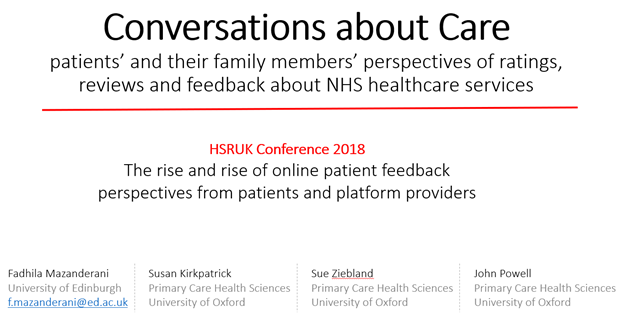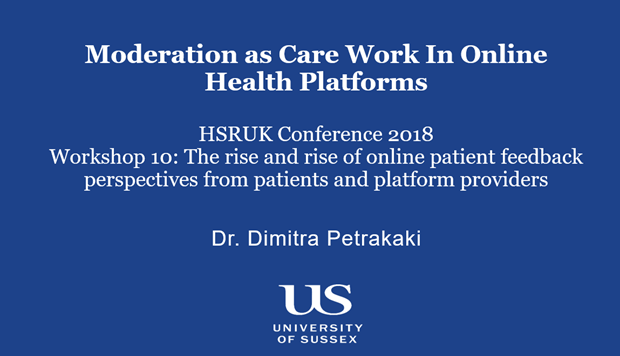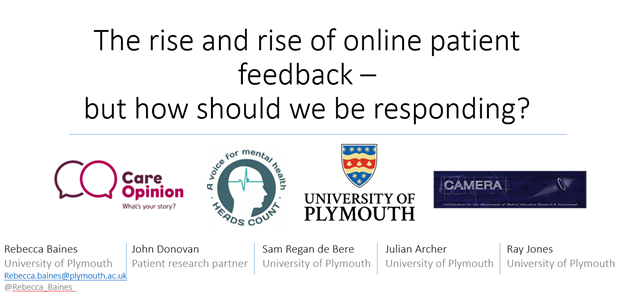
Yesterday I chaired a research symposium as a part of the HSRUK 2018 conference in Nottingham (HSR is health services research). This was notable for being the first time that independent academic research about Care Opinion from multiple research teams has been presented together.
There is a well-known "academic-practice" gap in research: too often, useful insights and information from research do not reach practitioners and policymakers in the healthcare system.
So, in an effort to help reduce the gap, I thought it might be helpful to at least share the slides from our HSRUK symposium on this blog (with kind permission from the respective authors).
Rather than comment specifically on each paper, I will simply post the slides and let them speak for themselves. Academic reports and journal papers are likely to be published in due course from each of these studies.
It's also likely that I won't be able to resist blogging in future about some of the interesting and important themes that are emerging from this research.
Conversations about care
The first paper was presented by Dr Fadhila Mazanderani of Edinburgh University, who is a member of the Inquire UK research team.
Moderation as care work
The second paper was presented by Dr Dimitra Petrakaki of Sussex University.
How should we be responding?
The third paper was presented by Rebecca Baines of Plymouth University.
I have previously blogged about this research, and more detail is available in an open-access journal paper.
Online feedback as care: papers from HSRUK 2018
Online feedback as care: papers from HSRUK 2018 https://www.careopinion.org.uk/resources/blog-resources/1-images/c204fee7b9d54e6092adb3d321cc07bd.png Care Opinion 0114 281 6256 https://www.careopinion.org.uk /content/uk/logos/co-header-logo-2020-default.pngUpdate from Care Opinion
Posted by James Munro, Director of Research & Development, Care Opinion, on
Response from Jane Danforth, Involvement & Experience Officer, Involvement, Experience and Volunteering Team, Nottinghamshire Healthcare NHS Trust on 9 Jul 2018 at 15:53
James thanks for adding the slides to the blog! It was a valuable experience to view the research papers and to be part of the panel representing Notts Healthcare at the conference.
Whilst we are pretty successful in getting staff to respond to feedback we sometimes remind staff (who may not be as ‘quick off the block’s as they could be) about the importance of responding on time. I particularly liked the slide about speed of responses from Rebecca Baines. I agree with the analysis of tailoring content. It's all very well to reply within the time frame but a 'fobbing off technique' can be sniffed out in a heartbeat! When this happens people may decide not to bother leaving their feedback again as change only come about when opinions are listened to and acknowledged openly online. The quality appraisal of existing responses is certainly something we can share with staff at Notts.
Rebecca Baines Sums it up e.g. Speed of response - Assurances of “we are listening to you” become undone if organisations fail to respond in sufficient time. Also worth mentioning is the content of the responses on Slide 6. Check it out.
Dr Fadhila Mazanderani and Conversation’s about Care drew interesting conclusions about online feedback finding that ‘42% of general public had read online feedback in the last year but only 8% of regular internet users in the study had provided the feedback in the same period and interestingly many NHS staff in this study were not prompting people to leave their feedback. At Notts Healthcare this is an area we want to improve on. We get lots of people reading our stories but most choose not to leave their feedback without an investment of time from our staff and feedback volunteers. Food for thought.
The presentation of Dr Dimitra Petrakaki and the moderation of Care Opinion stories discussed the emotional response of receiving stories for Care Opinion staff applying the moderation process.
Dr Petrakaki commented, ‘Care for the authors and a culture of care seems to be vital for moderation to occur’. The Care Opinion moderation process does really help us at Notts Healthcare. We have worked through stories together that are critical (3 and above) to provide a thoughtful and considered response though we can always do better. Over time, staff teams have become increasingly confident to own their own feedback and to provide a response that they themselves would be happy to receive.
Feedback is only useful if we do something with it and take action. We are still learning. The research papers have given me ideas about how we can share what we do more effectively. Digital platforms are becoming increasingly important as ‘change communicators’ but what really matters? I believe that the people leaving the feedback about their care need to hear about those changes far faster and benefit from them feeling valued because we listened and changed something due to their opinions.



